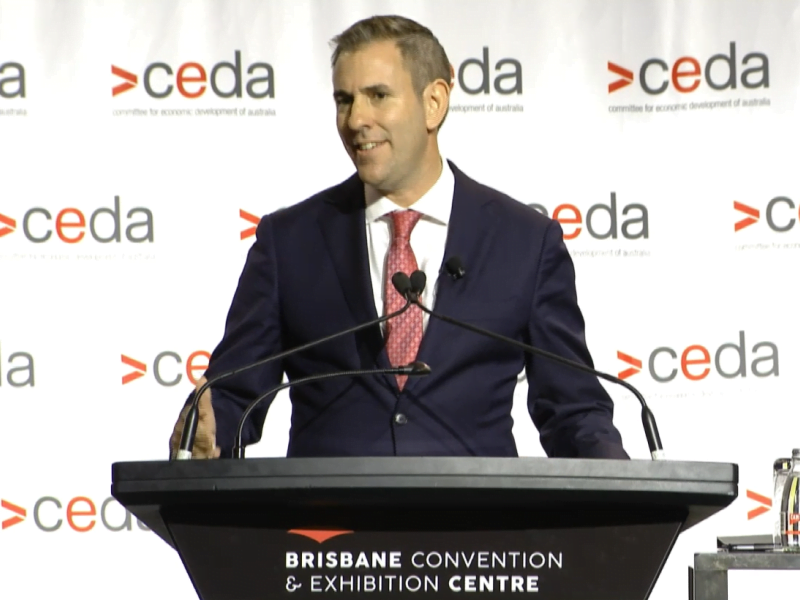Digital and CleanTech will be key to halting Australia’s relative productivity decline, according to Treasurer Jim Chalmers, who has again called for the Productivity Commission to be reformed.
Speaking at a Committee for Economic Development of Australia event in Brisbane on Thursday, the Treasurer also reiterated the importance of capitalising on the economic opportunities of the transition away from fossil fuels.
He described competing GreenTech investment incentives available under the United States Inflation Reduction Act and in the European Union as “a race to the top”.
The Treasurer will release the Productivity Commission’s (PC) five-yearly review of Australia’s productivity on Friday. It contains 71 recommendations, which the government claims to already be working on.

Increasing use of data and digital technology is one of the five key “trends and transitions” outlined in the PC report the Treasurer will release. However, he did not raise policy proposals, aside from ongoing initiatives to support a local tech skills uplift.
When asked if the PC’s inability to demonstrate the impacts of technology adoption on the macroeconomy is a threat to continued policy support for increasing uptake, Mr Chalmers argued that the PC needs to update its measures of productivity.
“We need to think differently about productivity in our economy, and I think it is for a lot of people a bit of a head scratcher that we’ve got these remarkable advances in technology… which don’t seem to be properly captured by the way we measure and think about and talk about productivity in our economy,” he said.
The Treasurer reiterated his view that there is a need to “renovate” Australia’s economics institutions, which includes the PC, to “do a much better job of firstly recognising but also making the most out of the ways that technology is changing our communities and our economy”.
University of Technology Sydney Emeritus Professor Roy Green has previously criticised the PC for persisting with laissez-faire economics while other countries are implementing “serious and purposeful government policy” on industrial strategy that “involves a much greater amount of government intervention than we currently experience”.
Regarding Australia’s clean energy opportunity, the Treasurer rebuked commentary that there is a global “race to the bottom on subsidies and support for green industries in GreenTech”.
“I see it as this kind of Race to the Top. We should be in that and we are in that. Australia has massive advantages in areas like critical minerals, battery manufacturing, hydrogen…we shouldn’t fear and we shouldn’t shirk from a race to the top on clean energy technology, Mr Chalmers said.
“I feel like in the future, they will write about the 2020s as the defining decade…and the thing that they will view that through is whether or not we made the most of our opportunities in cleaner and cheaper energy, and what that meant for our ability to create a broader and deeper industrial base, one that creates new industries but also maximises our traditional strengths and resources in agriculture and elsewhere.”
While he highlighted five broad themes that comprise the PC’s “policy agenda for a more productive Australia” and the “these groupings are useful” to the government, the Treasurer noted that not all the recommendations will be “consistent with the government’s priorities or values”.
“We don’t believe productivity gains come from scorched earth industrial relations, for example, or from abolishing clean energy programs,” the Treasurer said.
“Instead, we’ll get productivity gains from investing in our people and their abilities from making it easier to adapt and adopt technology so it works for us, not against us – And by creating the stability and certainty necessary for capital to flow towards areas where we have advantages and opportunities to underpin a more modern industrial base.”
Citing statistics from the forthcoming PC report, the Treasurer said “our productivity growth in the past decade has been the slowest in 60 years, averaging just 1.1 per cent a year – worse than the decade before and barely half the rate achieved during the 1990s”.
“Between 1970 and 2020, Australia fell on the OECD productivity rankings from sixth to 16th. If we stay stuck on the current course, the PC projects future incomes will be 40 per cent lower and the working week 5 per cent longer,” he said.
Do you know more? Contact James Riley via Email.

